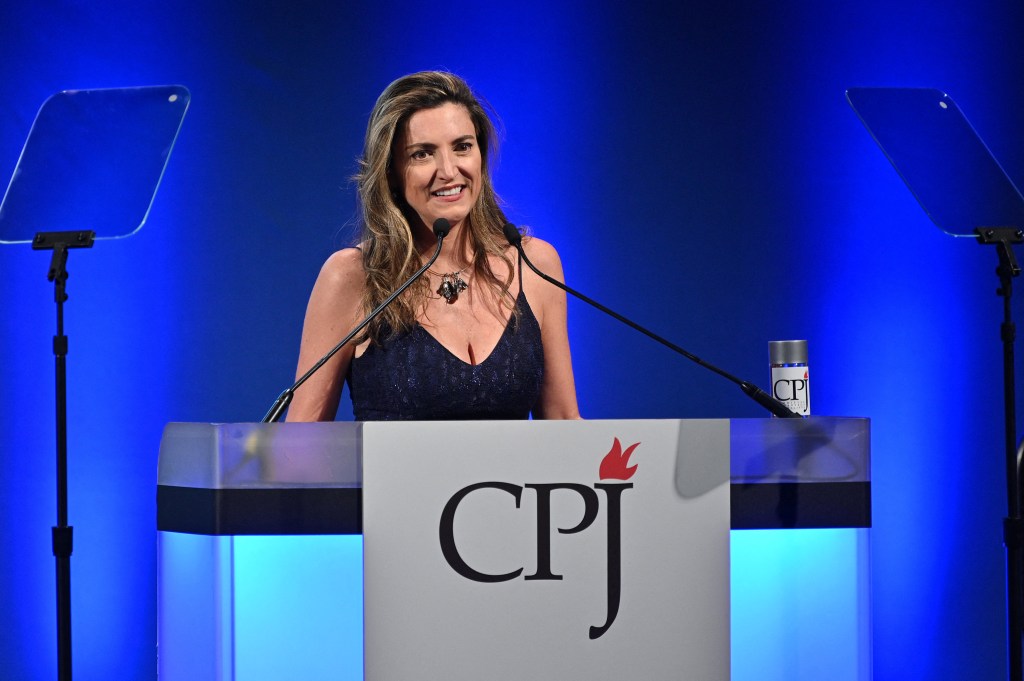In May of last year, Eduardo Bolsonaro, a Brazilian congressman and the son of President Jair Bolsonaro, made a series of searing accusations against journalist Patrícia Campos Mello on the YouTube channel of far-right media company Terça Livre.
He claimed that Campos Mello, a reporter with Brazilian daily Folha de S.Paulo, had attempted to use sex to gain damning information about his father and tried to interfere with the 2018 presidential election, according to the video, which CPJ reviewed before YouTube deleted the channel for violating its policies in an unrelated incident.
In response, Campos Mello sued the younger Bolsonaro for moral damages in a civil court – and won. On January 20, Judge Luiz Gustavo Esteves, of the 11th Civil Court in São Paulo state, ordered Bolsonaro to pay Campos Mello 30,000 reals (US$5,500), according to news reports.
In his decision, which CPJ reviewed, Judge Esteves wrote that Bolsonaro should “have more caution with his statements — something that is expected from all those with some sense of responsibility to the nation,” pointing to his position as the president’s son and an elected official who received a record number of votes in his 2018 bid for the House of Representatives.
Thus far, the ruling hasn’t deterred Bolsonaro, who repeated the claims in a February edition of Brazilian podcast Flow, according to news reports. Taís Gasparian, Campos Mello’s lawyer, told CPJ via phone that Bolsonaro may appeal the court’s decision.
Campos Mello, a 2019 recipient of CPJ’s International Press Freedom Award, previously told CPJ the environment for journalists has worsened under President Bolsonaro. She said she has faced ongoing harassment campaigns, including threatening and misogynistic online messages, insults hurled in the street, and lawsuits seeking moral damages over her reporting.
Campos Mello spoke with CPJ via phone about the significance of the court’s decision for journalists and the environment of harassment and threats against the press in Brazil. The interview has been edited for length and clarity.
What does this court decision mean for you and other journalists in Brazil?
This decision is a good sign for all journalists in Brazil. We have record numbers of attacks against journalists in Brazil and, in general, it seems that no one is held accountable. Members of this government have often used smear campaigns against journalists, including misogynistic [campaigns]. This decision is a first good sign that the judiciary will react to this.
Smear campaigns against journalists are used as a form of intimidation, to dissuade journalists from publishing investigative reporting. It’s good to see the judiciary responding to one of these campaigns. In this decision, in particular, it was important that the judge expressed that it is not acceptable for the president’s son to defame a journalist.
What can journalists, especially women, do to protect themselves from online harassment?
It is important to remember that online harassment does not just stay within the digital sphere — it spills over. You start receiving threats and being harassed on the street. Often, those who push online harassment say it’s a joke, and that we have no sense of humor. But online harassment is used to intimidate journalists and has been used systematically.
Social media platforms are making progress in regard to the spread of misinformation. But when it comes to online harassment, we have not seen significant advancement. They are not yet able to prevent a harassment campaign.
Journalists should seek out the various kits with guidelines and protocols about online harassment and digital security. They should not respond to messages, to avoid feeding into the cycle. If there is a threat, they should report it to the police. If it has offensive content, a journalist can try to sue for damages. It is also particularly important to keep one’s personal life separate, because [harassers] will go after their families too. Bring them to justice if necessary.
What are the challenges of practicing journalism in a country where the president and other members of the government often insult journalists and attempt to discredit the work of the press?
One thing that is new with this government is that they aggressively target journalists. And this aggression towards the press is then copied by other people. This creates an environment where it is permissible to attack journalists.
Especially with social media, [government officials] have created a kind of alternative reality in which the Brazilian press is considered “fake news” and the “enemy of the people.”
In addition to hostility towards the press, officials also make journalists’ work more difficult by withholding information or being less transparent.
Can you talk about the trend of judicial harassment against the Brazilian press, which includes content removal requests, police opening criminal investigations, and defamation lawsuits?
I find this legal offensive wave against the press very worrying. Until 2018, I had never been sued in my life, and suddenly it seems that suing journalists has become an intimidation tactic.
There are several concerning aspects. Sometimes the amount requested by the plaintiff is too high. Those who sue journalists have started using the term “fake news” in the lawsuits, even though this term is not defined in our legislation. We saw the Minister of Justice recently invoke the National Security Law to silence critics. Many journalists, especially freelancers, have no legal support.
The lawsuits put economic pressure on journalists and media outlets. Ultimately, this trend towards judicial harassment inhibits investigative journalism.
[Editor’s note: CPJ emailed the 11th Civil Court of São Paulo, Congressman Eduardo Bolsonaro, and the press offices of the Ministry of Justice and the Presidency for comment but received no responses.]
